2023年中考英语复习 八年级(下) Units 4-6课件(共40张PPT)
文档属性
| 名称 | 2023年中考英语复习 八年级(下) Units 4-6课件(共40张PPT) |  | |
| 格式 | ppt | ||
| 文件大小 | 2.1MB | ||
| 资源类型 | 教案 | ||
| 版本资源 | 人教新目标(Go for it)版 | ||
| 科目 | 英语 | ||
| 更新时间 | 2023-06-11 15:49:06 | ||
图片预览

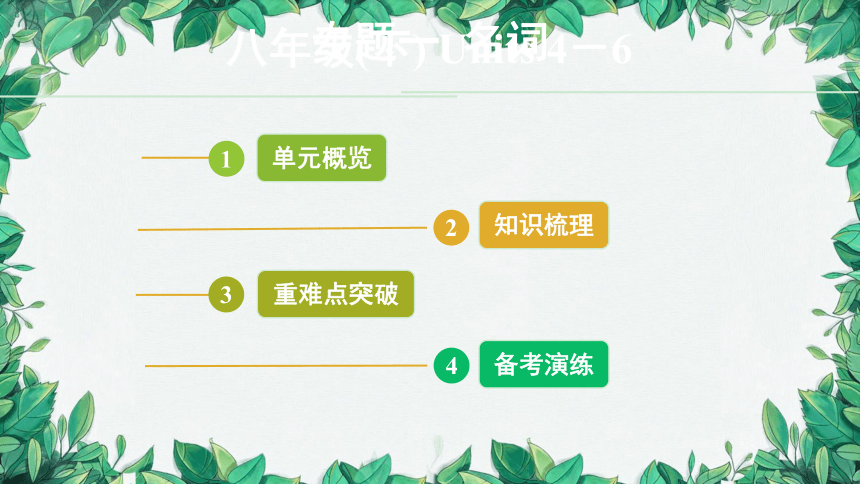
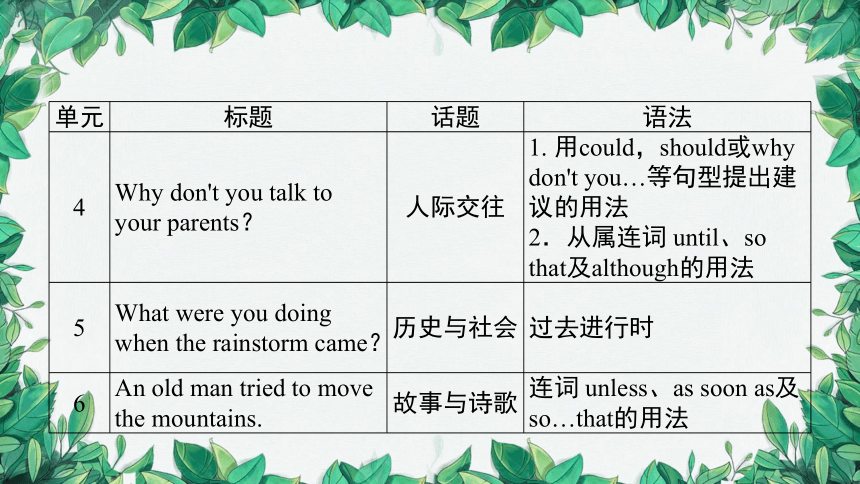
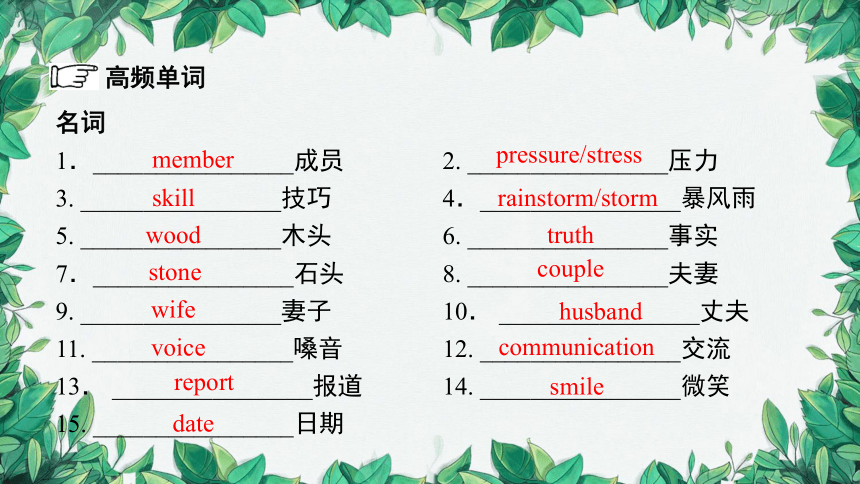
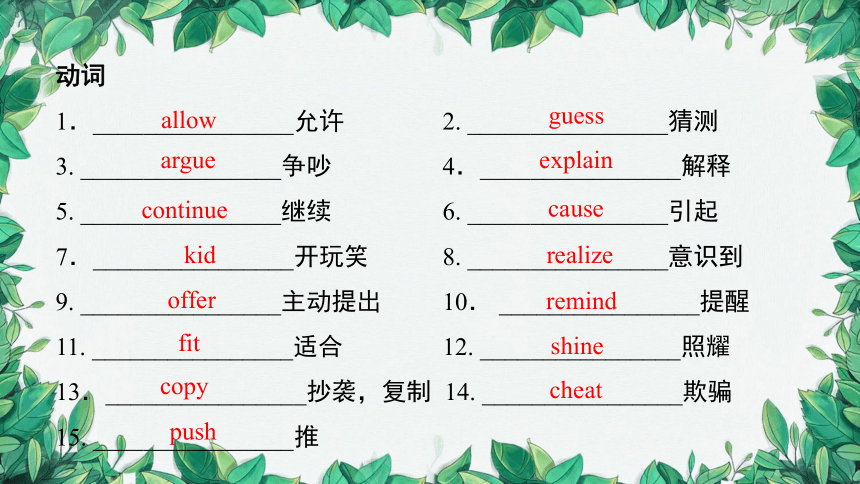

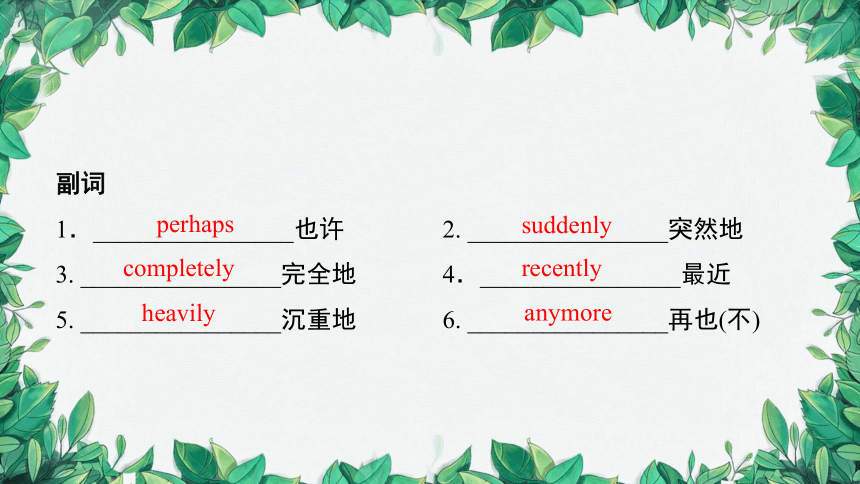
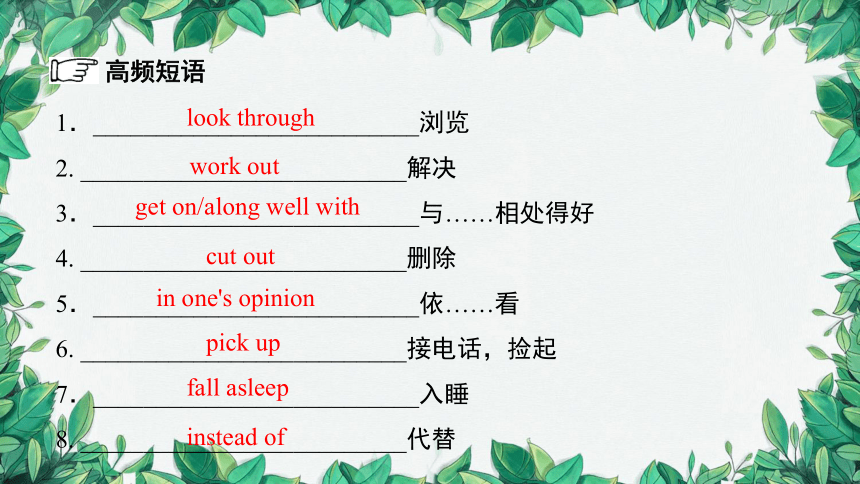


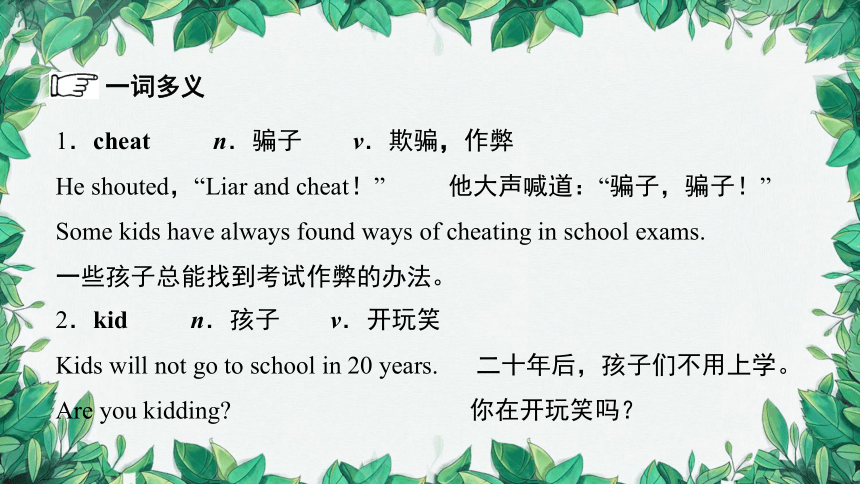

文档简介
(共40张PPT)
教材重难点梳理
专题一 名词
1
单元概览
2
知识梳理
3
重难点突破
4
备考演练
八年级(下) Units 4-6
单元 标题 话题 语法
4 Why don't you talk to your parents? 人际交往 1. 用could,should或why don't you…等句型提出建议的用法
2.从属连词 until、so that及although的用法
5 What were you doing when the rainstorm came? 历史与社会 过去进行时
6 An old man tried to move the mountains. 故事与诗歌 连词 unless、as soon as及so…that的用法
名词
1.________________成员 2. ________________压力 3. ________________技巧 4.________________暴风雨
5. ________________木头 6. ________________事实
7.________________石头 8. ________________夫妻
9. ________________妻子 10. ________________丈夫
11. ________________嗓音 12. ________________交流
13. ________________报道 14. ________________微笑
15. ________________日期
高频单词
member
pressure/stress
skill
rainstorm/storm
wood
truth
stone
couple
wife
husband
voice
communication
report
smile
date
动词
1.________________允许 2. ________________猜测
3. ________________争吵 4.________________解释
5. ________________继续 6. ________________引起
7.________________开玩笑 8. ________________意识到 9. ________________主动提出 10. ________________提醒
11. ________________适合 12. ________________照耀
13.________________抄袭,复制 14. ________________欺骗
15. ________________推
allow
guess
argue
explain
continue
cause
kid
realize
offer
remind
fit
shine
copy
cheat
push
形容词
1.________________年长的 2. ________________紧张的
3. ________________清楚易懂的 4.________________疯狂的 5. ________________奇怪的 6. ________________虚弱的
7.________________愚蠢的 8. ________________勇敢的 9. ________________明亮的
elder
nervous
clear
crazy
strange
weak
stupid/silly
brave
bright
副词
1.________________也许 2. ________________突然地 3. ________________完全地 4.________________最近
5. ________________沉重地 6. ________________再也(不)
perhaps
suddenly
completely
recently
heavily
anymore
1.__________________________浏览
2. __________________________解决
3.__________________________与……相处得好
4. __________________________删除
5.__________________________依……看
6. __________________________接电话,捡起
7.__________________________入睡
8. __________________________代替
高频短语
look through
work out
get on/along well with
cut out
in one's opinion
pick up
fall asleep
instead of
9.__________________________爱上 10. __________________________把……与……比较 11. __________________________起初 12. __________________________结婚 13. __________________________拆除 14. __________________________看一看 15. __________________________把……变成…… 16. __________________________沉默地
fall in love with
compare…with…
at first
get married
take down
have a look
turn…into…
in silence
精彩段落
经典背诵(根据中文提示完成短文,然后背诵文章)
In November 1979, pupils in England 1. ______________(能够) watch a new TV program called Monkey. Most of them were hearing the story 2. ______________ (第一次). The Monkey King, the main character of the story, is not just any normal monkey. 3. _________(事实上),he sometimes does not even 4. __________(看起来像) a monkey. This is because he can 5. ________himself _______(把……变成……) different animals and objects. Sometimes he can make his magic stick so small that he can keep it in his ear. 6. ____________(一……就……) the TV program 7. _________ (出版) more than 30 years ago, western children 8. _____________________(对……感兴趣) reading this story because the clever Monkey King keeps fighting to help the weak and never 9. ____________(放弃).
were able to
for the first time
In fact
look like
turn
into
As soon as
came out
became interested in
gives up
1.cheat n.骗子 v.欺骗,作弊
He shouted,“Liar and cheat!” 他大声喊道:“骗子,骗子!”
Some kids have always found ways of cheating in school exams. 一些孩子总能找到考试作弊的办法。
一词多义
2.kid n.孩子 v.开玩笑 Kids will not go to school in 20 years. 二十年后,孩子们不用上学。 Are you kidding 你在开玩笑吗?
3.return v.返回,归还
He will return in a week or so. 他会在一星期左右回来。
I must return some books to the library. 我得把一些书还回图书馆。
4.match n.火柴, 比赛 v.配对,相配
It's going to be a great match. 这将是一场了不起的比赛。
The shoes do match your dress. 这鞋子确实和你的裙子相配。
communicate v.交流——communication n.交流
快乐家族
1.win 和beat 的区别
win(won won):表示“赢”,其宾语是表示比赛、奖品等内容的词语。win还可作不及物动词用,后面不接宾语,表示“获胜”。
beat(beat beaten):表示在比赛中打败某人,意为“赢”,此时,其宾语只能是表示人或团队的词语。beat常表示“打”,这时指的是接连打击某人或某物。此外,beat还可以表示心脏的跳动。
(1)She ___________________ the second prize in the surfing competition.
(2)We ______________ the strongest team in the football match this time.
won
beat
2.when和while的区别
when:既可表示某一时间点,也可以表示某一时间段。在when 引导的时间状语从句中,其谓语动词可以是延续性的,也可以是非延续性的,可与主句中的谓语动词同时发生,也可在其后发生。when引导的时间状语从句多用一般现在时或一般过去时。
while:只能表示某一时间段,不能表示某一时间点。在while引导的时间状语从句中,其谓语动词只能是延续性的,而且也只能与主句中的谓语动词同时发生或存在。while引导的时间状语从句多用现在进行时或过去进行时。
注意:主句和从句都用进行时的时候,只能用while.
(1)He was working on the computer ________________ his son got home at eight last night.
(2)I was writing an e mail __________________ my brother was reading a book at that time.
when
while
3.listen和hear的区别
listen:意为“听”,强调听的动作,是不及物动词,后面加to接宾语。
hear(heard heard):意为“听到,听见”,强调听的结果。常用结构或短语:hear sb. do sth. 听见某人做了某事,hear sb. doing sth. 听见某人正在做某事,hear of/hear about听说,hear from sb. =receive a letter from sb. “收到某人的来信”。
(1)I ____________________ to the teacher carefully,but I could ____________________ nothing.
(2)She walked past the room and ____________________ somebody playing the piano.
hear
listened
heard
4.whole与all的区别
whole:作形容词时,修饰单数可数名词,放在冠词、指示代词、物主代词和名词所有格的后面,the whole day=all the day表示“一整天”。
all:作形容词时,修饰不可数名词或可数名词复数,放在定冠词、指示代词、物主代词前面。
(1)It rained cats and dogs the ____________________ day yesterday.
(2)Mr. Black is so humorous that ____________________ the students like him.
whole
all
5.rise 与raise 的用法
rise(rose risen):意为“上升,升起,增加”,是不及物动词,后面不能加宾语,指“某人/某物自己升起来”。
raise:意为“筹集,募集,提高,饲养”,是及物动词,后面必须有宾语,表提高、举起时表示“某人把某物举起来”。
(1)The sun _________________ in the east and sets in the west every day.
(2)If you know the answer,please ____________________ your hand.
rises
raise
6. sleep,go to sleep,fall asleep,go to bed的区别
sleep(slept slept):延续性动词,意为“睡觉”,可与表示一段时间的状语连用。
go to sleep:强调“入睡”这个动作,也就是begin to sleep。
fall asleep:意为“进入梦乡,睡着”,侧重“无意识地入睡”。asleep形容词,“睡着的”。
go to bed:意为“就寝,上床睡觉”,着重指上床准备睡觉。
(1)She was so tired that she ____________________ for a long time.
(2)Tony could understand nothing and finally _______________ in class.
slept
fell asleep
7.lose 与miss的用法
lose(lost lost):作动词,意为“丢失,失去,迷路”,一般指失去后不易找回。
miss:作动词,意为“未赶上,错过,遗失,想念,惦记”。作定语和表语表示“丢失的”意思时,lose 用过去分词 lost,而miss用现在分词missing。
(1)They ____________________ their way in the forest.
(2)He got up too late this morning and ________________ the early bus.
(3)They dragged(打捞) the river for the ____________________ child.
lost
missing/lost
missed
8.instead与instead of 的区别
instead :副词,意为“代替,反而,却”,置于句首或句末。
instead of:介词短语,意为“代替(某人或某物),而不是(某人或某物)”,后面跟名词、代词、动名词或者介词短语,of后面的内容是被代替的。
(1)She wrote him a letter ____________________ making a phone call.
(2)She didn't go to the concert. She stayed at home ________________.
instead of
instead
9.until和unless的区别
until+从句 作连词,引导时间状语从句。
用于肯定句时,意为“直到……为止”,表示主句的动作一直持续到从句动作发生或状态出现为止。主句的谓语动词必须是延续性动词,如live, wait, last, love, like, stay, work等。
用于否定句时,表示主句的动作在从句的动作发生之前尚未发生,或者说主句的动作在从句的动作发生之后才开始,一般可译为“直到……才……”。
unless+从句 作为连词,引导条件状语从句,意为“除非,如果不”相当于“if…not…”。
(1)Don't play ____________________ you finish your work, or your mom will be angry with you.
(2)Wait for me ____________________ I come back.
unless/until
until
一、完形填空。(建议用时: 7分钟)
There was once a farmer. He had a very big rabbit and a smart dog. One day, he organized a(n) __1__ between his dog and his rabbit. He made a hole in one of his biggest fields, and __2__ a carrot and a bone(骨头) in it. He wanted to see which animal would find them first.
( )1. A. show B.party C.activity D.competition ( )2. A. found B.hid C.discovered D.saw
D
B
The rabbit was very __3__, and he was busy looking for the carrot, digging here and there. He was completely sure that he would find the carrot and the bone first. But the dog wasn't optimistic(乐观的) at all. After he looked for the bone for a short time, he __4__ on the ground sadly.
( )3. A. excited B.lazy C.relaxed D.shy
( )4. A. woke up B.fell asleep
C.lay down D.ran around
A
C
And then he __5__ to complain(埋怨). He thought it was difficult for him to find one bone in such a big __6__.
The rabbit __7__ for hours. With every new hole, the dog complained about how difficult this was, even for the rabbit.
( )5. A. learned B.lived C.asked D.began
( )6. A. field B.hole C.house D.race
( )7. A. ran B.dug C.ate D.slept
A
B
D
The rabbit, on the other hand, kept on working hard. When there was __8__ place in the whole field left to dig, the rabbit dug a tunnel(隧道) to right under where the dog was lying all that time. There he found the carrot and the bone.
( )8. A. few B.any C.some D.no
D
And this was how the dog lost the competition. In fact,he found the __9__ place at the very beginning. But he failed to find the bone because he __10__ complained and didn't try at all. When we do something difficult in our life, we should learn from the rabbit.
( )9. A. big B.wrong C.right D.easy
( )10. A. only B.never C.seldom D.hardly
C
A
二、阅读理解。(建议用时: 6分钟)
Have you ever bought Genki Forest(元气森林) sparkling water because it's advertised as “sugar free”?
The company said the drinks are “sucrose -free”(零蔗糖), but this is not the same as “sugar- free”. Now the company has changed the words “sugar- free” to “low sugar” on the bottles. The company then apologized(道歉) for its misleading advertisement. In fact, there are many kinds of sugar. Sucrose is just one of them.
Other kinds of sugar, such as fructose(果糖) and sugar alcohol(糖醇), are still in Genki Forest drinks. These types of sugar are used as sweeteners(甜味剂). They offer little energy, but a small amount of them can make drinks taste sweet. That's why diet drinks like Genki Forest are popular among people who want to lose weight.
However, studies find that sweeteners might make people eat more. When you eat sweet -tasting things, it sends your brain a “sweet signal”. Then your brain tells your body to prepare itself to take in energy.
But since the diet soft drink has little energy, the brain will not receive what it is expecting. At this time, you will feel hungry and start getting energy by eating more food.
According to China Daily, drinking too many diet drinks might lead to obesity that will cause many illnesses, such as high blood pressure(高血压) and heart disease. It's time for you to think twice about the diet drink trend.
( )11. Why did Genki Forest apologize
A.For making too many advertisements.
B.For not having any sugar in its drinks.
C.For misspelling words on its packaging.
D.For advertising its products incorrectly.
D
( )12. What can we infer(推断) about Genki Forest from Paragraph 3
A.Its drinks might cause people to eat much more.
B.Its drinks have high levels of sucrose.
C.Its drinks taste sweeter than other drinks.
D.People can lose weight with its drinks.
A
( )13. What do studies show about sweeteners
A.They cause the brain to stop receiving signals. B.They provide enough energy for people.
C.They stop the body from getting energy. D.They probably make people feel hungrier.
( )14. The underline word obesity means ________.
A.health B.thinness C.fatness D.fashion
C
D
( )15. We can learn from the article that ________.
A.it's time for you to drink twice of the diet drinks
B.fructose and sugar alcohol offer a lot of energy, and a large amount of them can make drinks taste sweet
C.though diet drinks are popular among people, they are not as healthy as you think
D.since sucrose -free is the same as sugar -free, you could enjoy the diet drinks freely
C
三、小作文操练。
请根据下面的中文提示,用4~6句话描述“双减”政策后你的学校生活的变化情况以及你的感受,内容包括以下几点:
1.作业减少了很多。
2.有更多的时间培养自己的爱好。
3.可以多参加体育锻炼。
After “double reduction” policy, there have been many changes in my school life. ______________________________________________
_________________________________________________________________________________________________________________________________________________________________________________
My homework is clearly less than before. And I have enough time to take up my hobbies, so I can spend more time taking part in clubs and activities. Besides, I can do more regular exercise to make me healthier. Now I feel less stressed and happier than before.
教材重难点梳理
专题一 名词
1
单元概览
2
知识梳理
3
重难点突破
4
备考演练
八年级(下) Units 4-6
单元 标题 话题 语法
4 Why don't you talk to your parents? 人际交往 1. 用could,should或why don't you…等句型提出建议的用法
2.从属连词 until、so that及although的用法
5 What were you doing when the rainstorm came? 历史与社会 过去进行时
6 An old man tried to move the mountains. 故事与诗歌 连词 unless、as soon as及so…that的用法
名词
1.________________成员 2. ________________压力 3. ________________技巧 4.________________暴风雨
5. ________________木头 6. ________________事实
7.________________石头 8. ________________夫妻
9. ________________妻子 10. ________________丈夫
11. ________________嗓音 12. ________________交流
13. ________________报道 14. ________________微笑
15. ________________日期
高频单词
member
pressure/stress
skill
rainstorm/storm
wood
truth
stone
couple
wife
husband
voice
communication
report
smile
date
动词
1.________________允许 2. ________________猜测
3. ________________争吵 4.________________解释
5. ________________继续 6. ________________引起
7.________________开玩笑 8. ________________意识到 9. ________________主动提出 10. ________________提醒
11. ________________适合 12. ________________照耀
13.________________抄袭,复制 14. ________________欺骗
15. ________________推
allow
guess
argue
explain
continue
cause
kid
realize
offer
remind
fit
shine
copy
cheat
push
形容词
1.________________年长的 2. ________________紧张的
3. ________________清楚易懂的 4.________________疯狂的 5. ________________奇怪的 6. ________________虚弱的
7.________________愚蠢的 8. ________________勇敢的 9. ________________明亮的
elder
nervous
clear
crazy
strange
weak
stupid/silly
brave
bright
副词
1.________________也许 2. ________________突然地 3. ________________完全地 4.________________最近
5. ________________沉重地 6. ________________再也(不)
perhaps
suddenly
completely
recently
heavily
anymore
1.__________________________浏览
2. __________________________解决
3.__________________________与……相处得好
4. __________________________删除
5.__________________________依……看
6. __________________________接电话,捡起
7.__________________________入睡
8. __________________________代替
高频短语
look through
work out
get on/along well with
cut out
in one's opinion
pick up
fall asleep
instead of
9.__________________________爱上 10. __________________________把……与……比较 11. __________________________起初 12. __________________________结婚 13. __________________________拆除 14. __________________________看一看 15. __________________________把……变成…… 16. __________________________沉默地
fall in love with
compare…with…
at first
get married
take down
have a look
turn…into…
in silence
精彩段落
经典背诵(根据中文提示完成短文,然后背诵文章)
In November 1979, pupils in England 1. ______________(能够) watch a new TV program called Monkey. Most of them were hearing the story 2. ______________ (第一次). The Monkey King, the main character of the story, is not just any normal monkey. 3. _________(事实上),he sometimes does not even 4. __________(看起来像) a monkey. This is because he can 5. ________himself _______(把……变成……) different animals and objects. Sometimes he can make his magic stick so small that he can keep it in his ear. 6. ____________(一……就……) the TV program 7. _________ (出版) more than 30 years ago, western children 8. _____________________(对……感兴趣) reading this story because the clever Monkey King keeps fighting to help the weak and never 9. ____________(放弃).
were able to
for the first time
In fact
look like
turn
into
As soon as
came out
became interested in
gives up
1.cheat n.骗子 v.欺骗,作弊
He shouted,“Liar and cheat!” 他大声喊道:“骗子,骗子!”
Some kids have always found ways of cheating in school exams. 一些孩子总能找到考试作弊的办法。
一词多义
2.kid n.孩子 v.开玩笑 Kids will not go to school in 20 years. 二十年后,孩子们不用上学。 Are you kidding 你在开玩笑吗?
3.return v.返回,归还
He will return in a week or so. 他会在一星期左右回来。
I must return some books to the library. 我得把一些书还回图书馆。
4.match n.火柴, 比赛 v.配对,相配
It's going to be a great match. 这将是一场了不起的比赛。
The shoes do match your dress. 这鞋子确实和你的裙子相配。
communicate v.交流——communication n.交流
快乐家族
1.win 和beat 的区别
win(won won):表示“赢”,其宾语是表示比赛、奖品等内容的词语。win还可作不及物动词用,后面不接宾语,表示“获胜”。
beat(beat beaten):表示在比赛中打败某人,意为“赢”,此时,其宾语只能是表示人或团队的词语。beat常表示“打”,这时指的是接连打击某人或某物。此外,beat还可以表示心脏的跳动。
(1)She ___________________ the second prize in the surfing competition.
(2)We ______________ the strongest team in the football match this time.
won
beat
2.when和while的区别
when:既可表示某一时间点,也可以表示某一时间段。在when 引导的时间状语从句中,其谓语动词可以是延续性的,也可以是非延续性的,可与主句中的谓语动词同时发生,也可在其后发生。when引导的时间状语从句多用一般现在时或一般过去时。
while:只能表示某一时间段,不能表示某一时间点。在while引导的时间状语从句中,其谓语动词只能是延续性的,而且也只能与主句中的谓语动词同时发生或存在。while引导的时间状语从句多用现在进行时或过去进行时。
注意:主句和从句都用进行时的时候,只能用while.
(1)He was working on the computer ________________ his son got home at eight last night.
(2)I was writing an e mail __________________ my brother was reading a book at that time.
when
while
3.listen和hear的区别
listen:意为“听”,强调听的动作,是不及物动词,后面加to接宾语。
hear(heard heard):意为“听到,听见”,强调听的结果。常用结构或短语:hear sb. do sth. 听见某人做了某事,hear sb. doing sth. 听见某人正在做某事,hear of/hear about听说,hear from sb. =receive a letter from sb. “收到某人的来信”。
(1)I ____________________ to the teacher carefully,but I could ____________________ nothing.
(2)She walked past the room and ____________________ somebody playing the piano.
hear
listened
heard
4.whole与all的区别
whole:作形容词时,修饰单数可数名词,放在冠词、指示代词、物主代词和名词所有格的后面,the whole day=all the day表示“一整天”。
all:作形容词时,修饰不可数名词或可数名词复数,放在定冠词、指示代词、物主代词前面。
(1)It rained cats and dogs the ____________________ day yesterday.
(2)Mr. Black is so humorous that ____________________ the students like him.
whole
all
5.rise 与raise 的用法
rise(rose risen):意为“上升,升起,增加”,是不及物动词,后面不能加宾语,指“某人/某物自己升起来”。
raise:意为“筹集,募集,提高,饲养”,是及物动词,后面必须有宾语,表提高、举起时表示“某人把某物举起来”。
(1)The sun _________________ in the east and sets in the west every day.
(2)If you know the answer,please ____________________ your hand.
rises
raise
6. sleep,go to sleep,fall asleep,go to bed的区别
sleep(slept slept):延续性动词,意为“睡觉”,可与表示一段时间的状语连用。
go to sleep:强调“入睡”这个动作,也就是begin to sleep。
fall asleep:意为“进入梦乡,睡着”,侧重“无意识地入睡”。asleep形容词,“睡着的”。
go to bed:意为“就寝,上床睡觉”,着重指上床准备睡觉。
(1)She was so tired that she ____________________ for a long time.
(2)Tony could understand nothing and finally _______________ in class.
slept
fell asleep
7.lose 与miss的用法
lose(lost lost):作动词,意为“丢失,失去,迷路”,一般指失去后不易找回。
miss:作动词,意为“未赶上,错过,遗失,想念,惦记”。作定语和表语表示“丢失的”意思时,lose 用过去分词 lost,而miss用现在分词missing。
(1)They ____________________ their way in the forest.
(2)He got up too late this morning and ________________ the early bus.
(3)They dragged(打捞) the river for the ____________________ child.
lost
missing/lost
missed
8.instead与instead of 的区别
instead :副词,意为“代替,反而,却”,置于句首或句末。
instead of:介词短语,意为“代替(某人或某物),而不是(某人或某物)”,后面跟名词、代词、动名词或者介词短语,of后面的内容是被代替的。
(1)She wrote him a letter ____________________ making a phone call.
(2)She didn't go to the concert. She stayed at home ________________.
instead of
instead
9.until和unless的区别
until+从句 作连词,引导时间状语从句。
用于肯定句时,意为“直到……为止”,表示主句的动作一直持续到从句动作发生或状态出现为止。主句的谓语动词必须是延续性动词,如live, wait, last, love, like, stay, work等。
用于否定句时,表示主句的动作在从句的动作发生之前尚未发生,或者说主句的动作在从句的动作发生之后才开始,一般可译为“直到……才……”。
unless+从句 作为连词,引导条件状语从句,意为“除非,如果不”相当于“if…not…”。
(1)Don't play ____________________ you finish your work, or your mom will be angry with you.
(2)Wait for me ____________________ I come back.
unless/until
until
一、完形填空。(建议用时: 7分钟)
There was once a farmer. He had a very big rabbit and a smart dog. One day, he organized a(n) __1__ between his dog and his rabbit. He made a hole in one of his biggest fields, and __2__ a carrot and a bone(骨头) in it. He wanted to see which animal would find them first.
( )1. A. show B.party C.activity D.competition ( )2. A. found B.hid C.discovered D.saw
D
B
The rabbit was very __3__, and he was busy looking for the carrot, digging here and there. He was completely sure that he would find the carrot and the bone first. But the dog wasn't optimistic(乐观的) at all. After he looked for the bone for a short time, he __4__ on the ground sadly.
( )3. A. excited B.lazy C.relaxed D.shy
( )4. A. woke up B.fell asleep
C.lay down D.ran around
A
C
And then he __5__ to complain(埋怨). He thought it was difficult for him to find one bone in such a big __6__.
The rabbit __7__ for hours. With every new hole, the dog complained about how difficult this was, even for the rabbit.
( )5. A. learned B.lived C.asked D.began
( )6. A. field B.hole C.house D.race
( )7. A. ran B.dug C.ate D.slept
A
B
D
The rabbit, on the other hand, kept on working hard. When there was __8__ place in the whole field left to dig, the rabbit dug a tunnel(隧道) to right under where the dog was lying all that time. There he found the carrot and the bone.
( )8. A. few B.any C.some D.no
D
And this was how the dog lost the competition. In fact,he found the __9__ place at the very beginning. But he failed to find the bone because he __10__ complained and didn't try at all. When we do something difficult in our life, we should learn from the rabbit.
( )9. A. big B.wrong C.right D.easy
( )10. A. only B.never C.seldom D.hardly
C
A
二、阅读理解。(建议用时: 6分钟)
Have you ever bought Genki Forest(元气森林) sparkling water because it's advertised as “sugar free”?
The company said the drinks are “sucrose -free”(零蔗糖), but this is not the same as “sugar- free”. Now the company has changed the words “sugar- free” to “low sugar” on the bottles. The company then apologized(道歉) for its misleading advertisement. In fact, there are many kinds of sugar. Sucrose is just one of them.
Other kinds of sugar, such as fructose(果糖) and sugar alcohol(糖醇), are still in Genki Forest drinks. These types of sugar are used as sweeteners(甜味剂). They offer little energy, but a small amount of them can make drinks taste sweet. That's why diet drinks like Genki Forest are popular among people who want to lose weight.
However, studies find that sweeteners might make people eat more. When you eat sweet -tasting things, it sends your brain a “sweet signal”. Then your brain tells your body to prepare itself to take in energy.
But since the diet soft drink has little energy, the brain will not receive what it is expecting. At this time, you will feel hungry and start getting energy by eating more food.
According to China Daily, drinking too many diet drinks might lead to obesity that will cause many illnesses, such as high blood pressure(高血压) and heart disease. It's time for you to think twice about the diet drink trend.
( )11. Why did Genki Forest apologize
A.For making too many advertisements.
B.For not having any sugar in its drinks.
C.For misspelling words on its packaging.
D.For advertising its products incorrectly.
D
( )12. What can we infer(推断) about Genki Forest from Paragraph 3
A.Its drinks might cause people to eat much more.
B.Its drinks have high levels of sucrose.
C.Its drinks taste sweeter than other drinks.
D.People can lose weight with its drinks.
A
( )13. What do studies show about sweeteners
A.They cause the brain to stop receiving signals. B.They provide enough energy for people.
C.They stop the body from getting energy. D.They probably make people feel hungrier.
( )14. The underline word obesity means ________.
A.health B.thinness C.fatness D.fashion
C
D
( )15. We can learn from the article that ________.
A.it's time for you to drink twice of the diet drinks
B.fructose and sugar alcohol offer a lot of energy, and a large amount of them can make drinks taste sweet
C.though diet drinks are popular among people, they are not as healthy as you think
D.since sucrose -free is the same as sugar -free, you could enjoy the diet drinks freely
C
三、小作文操练。
请根据下面的中文提示,用4~6句话描述“双减”政策后你的学校生活的变化情况以及你的感受,内容包括以下几点:
1.作业减少了很多。
2.有更多的时间培养自己的爱好。
3.可以多参加体育锻炼。
After “double reduction” policy, there have been many changes in my school life. ______________________________________________
_________________________________________________________________________________________________________________________________________________________________________________
My homework is clearly less than before. And I have enough time to take up my hobbies, so I can spend more time taking part in clubs and activities. Besides, I can do more regular exercise to make me healthier. Now I feel less stressed and happier than before.
